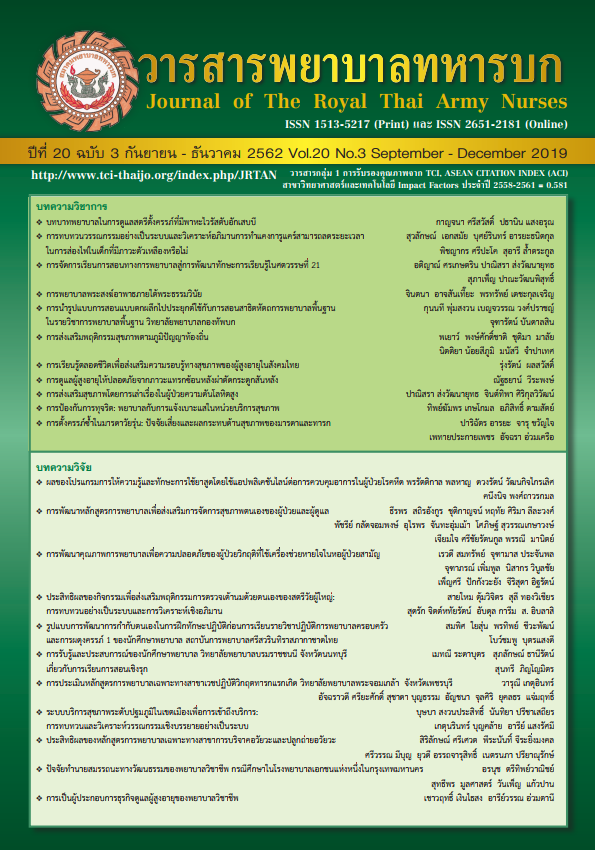Working as A Member of The House of Representative of Professional Nurses
Keywords:
Working as a member of the house of representative, politician, professional nurse, Phenomenological researchAbstract
The purpose of this study was to explore working experiences as a member of the House of Representative of professional nurses. The Heidegger’s hermeneutic phenomenology was applied for this study. Seven nurses, who were used to be members of the House of Representatives in Thailand at least one term in their political positions, willingly participated in this study. In-depth interviews with tape-recordings, observation, field notes and artifacts were used for data collection. Study data were analyzed by using a content analysis of van Manen’s method. The study findings fell into 6 themes: 1) being an honest politician, 2) applying holistic healthcare to help people, 3) being a committee on health 4) participating the making of Acts, 5) interrogating participation and 6) censuring a debate.
Downloads
References
2. Duangwichai N. Tables of the difference in Constitution of the Kingdom of Thailand BE 2540 to 2550 with a brief reason. Bangkok: Office of the Secretary of the House of Representatives; 2008. p. 12-16. (In Thai)
3. Betts VT. Nurses and political action: Concepts & challenges. 3rded. Philadelphia: Saunders;2001.
4. Wasee P. Health as an ideology of human beings. Nonthaburi : Health Systems Research Institute; 2000. (In Thai)
5. Srisuphan V., Sawaengdee K. Policy recommendations to solve the shortage of nurses in Thailand. Thai Journal of Nursing Council. 2012; 27(1):5-12. (In Thai)
6. Sunanta S., Yusamran C., Phahuwatanakarn W. Effect of Providing Knowledge and Support Primiparous Adolescent Mother and Grandmother on Maternal Role Attainment. Journal of the Royal Thai Army Nurses. 2016;17(2) : 125-134. (In Thai)
7. Secretariat of the Senate. The study report on Universal health care coverage and the urgent problem of public health. Bangkok: Secretariat of the Senate; 2008. (In Thai)
8. Streubert HJ., Carpenter DR. Qualitative research in nursing advance the humanistic imperative. 5thed. New York: Lippincott Williams & Wilkins; 2011
9. Oumtanee A. Qualitative Research in Nursing. Bangkok: Chulalongkorn University Press; 2016. (In Thai)
10. van Manen M. Researching lived experience: Human science for an action sensitive pedagogy. New York: State University of New York Press; 1990.
11. Guba EG., Lincoln YS. Handbook of qualitative research. Thousand Oaks: Sage; 1994.
12. Thailand Nursing and Midwifery Council. The Professional Nursing and Midwifery Act BE 2528 (revision BE 2540). Nonthaburi: Thailand Nursing and Midwifery Council; 1997. (In Thai)
13. Kongrod P. Foundation of Political Science. Bangkok: M.T. Press; 2010. (In Thai)
14. Taweeseth W., Nounsakul S., Chitnuphong W. Politics and government of Thailand. Bangkok: Ramkamhaeng University Press; 2015. (In Thai)
15. Chinnabut W. Election. Bangkok : Ramkamhaeng University Press; 2016. (In Thai)
16. Craven RF., Hirnle CJ. Fundamentals of Nursing: Human Health and Function. 4thed. Philadelphia : W.B. Saunders; 2012.
17. Tawmit S. Thai parliamentary system. Bangkok: Odienstore Press; 2006. (In Thai)
18. Thamrongthanyawong S. Thai Politics. Bangkok: Semadhamma Press; 2006. (In Thai)
19. Phunchan S. Politics and government of Thailand. Phitsanulok: Rajamangala University of Technology Lanna Press; 2014. (In Thai)
Downloads
Published
How to Cite
Issue
Section
License
บทความหรือข้อคิดเห็นใดใดที่ปรากฏในวารสารพยาบาลทหารบกเป็นวรรณกรรมของผู้เขียน ซึ่งบรรณาธิการหรือสมาคมพยาบาลทหารบก ไม่จำเป็นต้องเห็นด้วย
บทความที่ได้รับการตีพิมพ์เป็นลิขสิทธิ์ของวารสารพยาบาลทหารบก
The ideas and opinions expressed in the Journal of The Royal Thai Army Nurses are those of the authors and not necessarily those
of the editor or Royal Thai Army Nurses Association.






